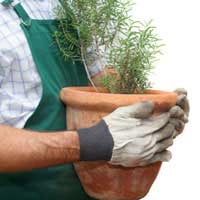Can Pest Control be Natural?

While we may automatically tend to equate pest control with pesticides, chemical measures are not the only option available. While some of the alternatives have a long history – the domestic cat, for example, kept mice out of the grain stores of ancient Egypt – others are not so well known and some of them are very new indeed.
Natural Pest Repellents
A variety of non-chemical methods can be used to repel pests. Plants which are particularly prone to slug damage, for example, such as hostas, can be protected with sharp gravel or crushed egg-shells, while fresh mint is said to help stop mice from raiding cupboards and aromatic red cedarwood will keep moths out of your wardrobe.Some plants too can be grown alongside vulnerable species in the garden to give them protection. Pyrethrum, for instance – also sometimes known as the tansy plant – produces a natural, and very effective, insecticide and some gardeners have found that members of the alliumfamily such as chives, garlic and onion, are helpful in keeping aphids away.
Herbs, unsurprisingly, feature high on the list of natural pest control agents, either grown as companion crops or used freshly chopped or powdered. Rosemary, sage and thyme can reduce caterpillar damage in cabbages and other plants, principally by reducing the number of eggs laid on them by pest species. Fresh rosemary also seems to help control ticks and fleas – an ability shared by fennel, wormwood and rue.
Natural Enemies
Many types of pests have their natural enemies which can be recruited to act as free pest control – with the great benefit that they are permanently on watch and can often be very good at telling friend from foe, leaving beneficial insects alone, for example. This kind of approach is particularly useful in the garden and one of the quickest ways is to encourage a pest’s natural predators to take up residence. Building a garden pond, for instance, will not only provide a decorative water feature but also attract frogs and toads, which have an incredible appetite for all manner of creepy crawlies. Providing a small pile of logs or leaving a few undisturbed spots under shrubs or hedges may give a hedgehog shelter – and it has long been jokingly remarked that slug problems only occur when there are no hedgehogs!Ladybirds, lacewings and hoverflies are also very good at pest control – especially for aphids and their like. They can be bought – mainly through specialist suppliers catering for commercial glasshouse growers – or encouraged, which is probably more practical for most gardeners. Planting milfoil is said to attract ladybirds and growing yellow flowers, such as marigolds, seems to attract hoverflies.
Targeted Biological Control
While it is not often that the natural enemies of a pest eat it – and only it – biological control can sometimes be very specific indeed. Many slug killers involve watering huge numbers of the microscopic nematode worm, Phasmarhabditis hermaphrodita, into the soil. They then seek out slugs, enter their bodies and infect them with a fatal disease which only affects this particular kind of pest – the ultimate in miniature natural guided missiles! Work is currently underway to try to produce a similar type of product for wire worms, root maggots and even cockroaches.Pesticides have their place – the global insecticide market alone is worth an annual $10 billion (US) – but it is not always necessary to reach for the spray-gun to deal with every pest problem. Sometimes the solutions can be very simple – blocking up the holes through which ants are entering your kitchen, or protecting your young seedling inside a cloche, for example. Even for more complicated needs, such as some of those discussed here, there are often natural pest control methods to consider.


Re: Do Rabbit Droppings Attract Mice or Rats?
Except for rat droppings, how can I tell if a rat or mouse has been eating my rabbits food? This morning I…
Re: Do Rabbit Droppings Attract Mice or Rats?
Get a cat! They will at least chase (and maybe kill or maim) a mouse or rat!!!
Re: Do Rabbit Droppings Attract Mice or Rats?
I have my two bunnies as backyard bunnies. I got a bit lazy and had left Cheerios (their favorite treat) out on…
Re: Flies: Houseflies and Bluebottles
I my first-floor flat, (whose windows are normally closed because of traffic noise) I have, in last few days, suddenly had…
Re: Do Rabbit Droppings Attract Mice or Rats?
Excuse my ignorance but I need to clarify something. Someone wrote in about finding a rat inside the cage with…
Re: Do Rabbit Droppings Attract Mice or Rats?
I have a pet rabbit and have just had to try and chase a wild mouse out of the room its now down in the walls of…
Re: Flies: Houseflies and Bluebottles
My daughter lives in a ground floor flat an has had a major fly problem all the time she's been there 18 months. These are…
Re: Flies: Houseflies and Bluebottles
Inundated with house flies - small but two days running in my kitchen and sitting room - keeping doors to rest of flat shut.…
Re: Flies: Houseflies and Bluebottles
For the past days flies have been appearing one at a time, up to 30 a day. There is no smell and we cant find any food etc.…
Re: Flies: Houseflies and Bluebottles
@Ry - I know how you feel. It seems to be worse in August. I think it's the fact that our bins are only emptied once a…